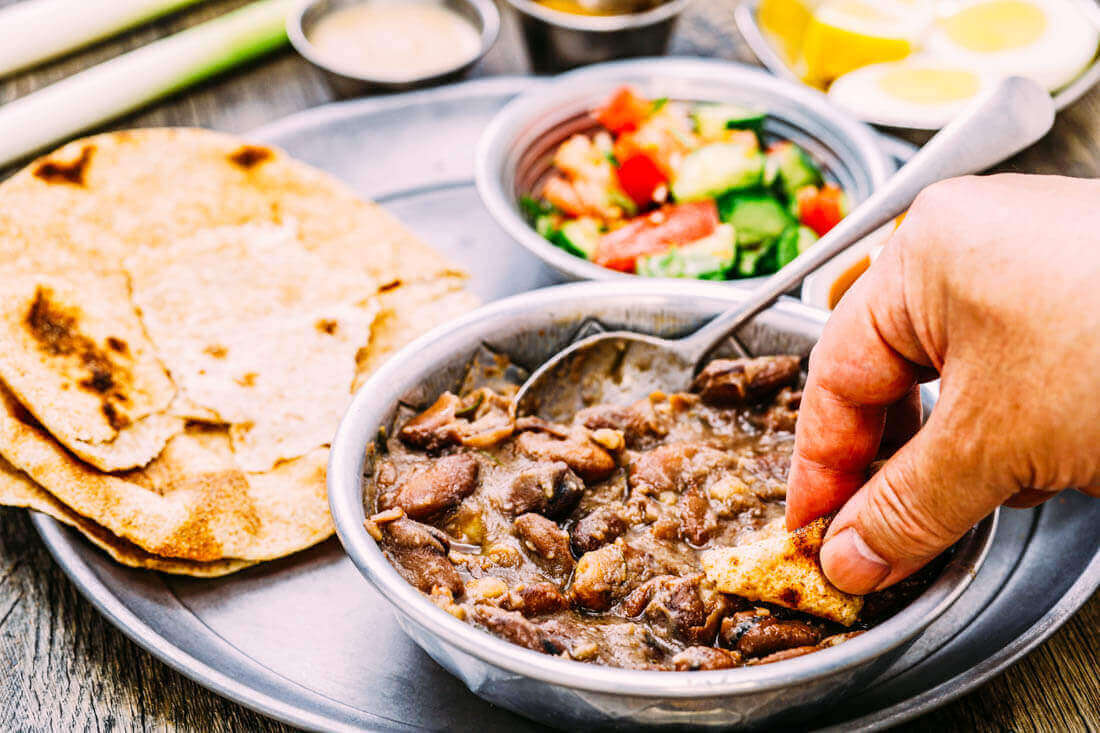On every street corner in Egypt, you will find a cart selling fava bean and falafel sandwiches for all Egyptians. These sandwiches have always been daily source of nutrition for many Egyptians and have come to symbolize not only Egypt’s breakfast culture, but also the national identity.
Many Egyptians associate their sense of being Egyptian with their daily fava bean sandwich. One Egyptian once joked that the annual expenditure on food subsidies likely exceeds the annual profits from the Suez Canal, highlighting the significant cultural impact of this simple breakfast meal.
Abu Hamza’s day begins at 4 AM sharp, even on Fridays when the city is typically quiet. He endures the sweltering heat in August as he sells fava bean sandwiches and potatoes until midday at the Fifth Settlement, which is lengthy drive from his own home in Old Cairo.
With dwindling customers and shrinking purchase amounts, Hamza reveals the harsh impact of rising prices. “People used to buy multiple sandwiches at a lower price, like around 20 EGP (USD 0.41),” he explains, “but now they can only afford two for 30 EGP (USD 0.61).”
The rising cost of living has hit him hard too. “My ingredients used to cost around 40 EGP (USD 0.81) a few years ago,” he says, “but now I spend 200 EGP (USD 4.06). With four children to support, I have no choice but to work longer hours and start earlier each day.”
Back in the 1980s, the landscape for food cart vendors was vastly different. When Maha Qorany, now 54, was in high school and living in Beni Suef, breakfast was the most effortless and convenient meal of the day. All she had to do was call the man at the vendor from her window, and he would deliver her breakfast in a basket, which was hoisted up to her window by a rope.
While breakfast may not hold the same significance across all cultures, for Egyptians, it has consistently been the most affordable and accessible meal of the day. In Qorany’s day, breakfast typically featured nutrient-rich foods at relatively low prices and were within the reach of most Egyptians’ salaries.
For merely two Egyptian pounds, Qorany could purchase fava beans, falafel, eggplant, bread, and arugula. Each item cost about a quarter of a pound or 50 cents, while a kilogram of fresh milk —a key source of protein— was also around 50 cents.
However, as inflation continues its upward trajectory, a growing number of Egyptians are finding it increasingly difficult to afford breakfast, transforming it from a daily necessity to an occasional treat.
The Shrinking Breakfast Budget
Soaring global inflation, triggered by a series of economic crises, has pushed many families to the brink. Over half of Europeans have experienced a tighter budget in the past three years, often leading to difficult choices about food.
Nearly one-third of Europeans have skipped meals due to hunger, with the situation particularly acute in Greece and Moldova.
Most experts agree that a healthy, nutrient-rich breakfast should include whole grains, and healthy proteins and fats. However, with inflation in Egypt reaching a historic high of 38.0 percent in 2023, many middle- and low-income families are reducing their consumption of protein-rich foods, such as eggs and dairy products.
Egypt’s long-standing food subsidy program has been a crucial lifeline for many families, particularly during economic downturns marked by currency devaluation and soaring food prices. Bread, a staple food, has been a central component of this support system.
The price of subsidized bread has inrease in recent years. Since 2014, the bread’s weight has been reduced four times, and in May, its price increased from 0.05 EGP (USD 0.0011) to 0.20 pounds per loaf. Simultaneously, essential goods like eggs, rice, sugar, and oil have become significantly more expensive.
The government’s decision may be attributed to two primary issues with the subsidy program. First, according to a previous research, many beneficiaries have become overly reliant on subsidized goods, neglecting to consume a balanced diet by incorporating other, unsubsidized food items. This has led to nutritional deficiencies.
Secondly, some beneficiaries were denied their entitled subsidized goods due to misappropriation by those exploiting the system, depriving the most vulnerable of much-needed support.
However, some experts predict that rising prices of subsidized goods will not encourage a shift towards healthier diets. Instead, they anticipate that continued price increases will force households to opt for cheaper, less nutritious foods, exacerbating existing dietary challenges.
Between 2015 and 2020, the proportion of total income that low-income families spent on food rose from 45 percent to 69 percent, according to data from CAPMAS. Protein prices have also soared in recent years, as key items such as cheese and eggs have seen a 200 percent increase in cost between 2022 and 2024.
Today, Qorany’s breakfast has changed significantly in both quantity and cost. As a young doctor, with a salary of approximately 4,000 EGP (82 USD), she now spends a substantial portion of her income on food. The same breakfast she enjoyed in almost 44 years ago now costs around 50 EGP (1 USD), totaling nearly 2,000 EGP (40 USD) a month, and consuming about half of her salary.
“Previously, we relied on fresh, locally sourced ingredients for our breakfast, especially milk. Today, however, everything has shifted to being purchased from supermarkets or hypermarkets, which are often more expensive,” she tells Egyptian Streets.
Marwa Ahmed*, 48, observes a recent trend among her work colleagues: downsized breakfast budgets. Many are now opting for a simpler meal of one fava bean sandwich and a falafel sandwich instead of the more substantial breakfast they used to enjoy with eggs and milk.
“As a mother, I feel compelled to ensure my children have a nutritious start to their day, but the escalating prices have forced many families to reduce breakfast portions significantly.”
To manage the impact of inflation, many Egyptians have begun reducing their breakfast portions, sharing meals with friends and family, or opting for more affordable alternatives. A report by The New Arab indicates that some individuals have adopted a vegan diet as a response to the dramatic increase in food prices.
In response to the financial crisis, many Egyptians have turned to low-budget strategies. A newly launched platform, “I’m Low Budget,” offers information on the most affordable fast food options to help those facing high prices yet still needing a non-homemade meal.
At Gad, a popular budget-friendly breakfast spot for Egyptians, a plain fava bean sandwich and a falafel sandwich each cost 11 EGP (0.22 USD), totaling 22 EGP (0.45 USD). In 2017, the same meal would have cost about 5 EGP (0.10 USD), reflecting a 340 percent increase.
Another popular budget-friendly breakfast spot is El Shabrawy, where a plain fava bean sandwich costs 10 EGP (0.20 USD) and a falafel sandwich costs 11 EGP. In 2017, the same meal would have cost approximately 4.5 EGP (0.09 USD).
Egypt grapples with a significant malnutrition problem primarily linked to a diet heavy in carbohydrates and deficient in protein and vegetables. This nutritional crisis aligns with the country’s position among the 36 nations bearing the brunt of the global malnutrition burden.
Alternative nutrient intakes
To ensure affordable protein sources for Egyptians and keep breakfast within reach, experts recommend localizing fodder crops, the fodder industry, and fodder additives.
This approach aims to reduce reliance on dollar-based components in animal protein production, helping to stabilize prices despite fluctuations in the exchange rate.
Experts propose enhancing the nutritional well-being of Egypt’s impoverished population by broadening the subsidized food program to include micronutrient-rich items such as fresh fruits and vegetables.
Additionally, public awareness campaigns are crucial to educate Egyptians about the benefits of a balanced and varied diet.







Comments (0)